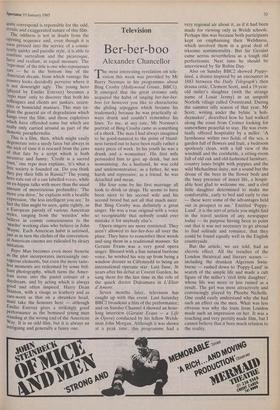Television
Ber-ber-boo
Alexander Chancellor
he most interesting revelation on tele-
vision this week was provided by Mr Barry Norman in his programme about Bing Crosby (Hollywood Greats, BBC1). It emerged that the great crooner only acquired the habit of singing ber-ber-ber- boo (or however you like to characterise the gliding arpeggios which became his trademark) because he was practically al- ways drunk and couldn't remember his lines. To me, at any rate, Mr Norman's portrait of Bing Crosby came as something of a shock. The man I had always imagined to be good-natured to the point of bland- ness turned out to have been really rather a nasty piece of work. In his youth he was a drunk and a womaniser. His first wife persuaded him to give up drink, but not womanising. As a husband, he was cold and undemonstrative; as a father, he was harsh and repressive; as a friend, he was detached and mean.
His four sons by his first marriage all took to drink or drugs. He seems to have been nicer to his second wife and his second brood but not all that much nicer. But Bing Crosby was definitely a great singer. He was a true original with a voice so recognisable that nobody could ever mistake it for anybody else's.
Opera singers are more restricted. They aren't allowed to ber-ber-boo all over the place. They have to remember their words and sing them in a traditional manner. Sir Geraint Evans was a very good opera singer. Blessed with a fine natural baritone voice, he worked his way up from being a window dresser in Cilfynnydd to being an international operatic star. Last June, 36 years after his debut at Covent Garden, he sang there for the last time in the role of the quack doctor Dulcamara in L'Elisir d'Amore.
Seven months later, television has caught up with this event. Last Saturday BBC2 broadcast a film of the performance; and on Sunday Channel 4 showed an hour- long interview (Geraint Evans — a Life in Opera) conducted by his fellow Welsh- man John Morgan. Although it was shown at a peak time, this programme had a
very regional air about it, as if it had been made for viewing only in Welsh schools. Perhaps this was because both participants kept on emphasising their Welshness, which involved them in a great deal of irksome sentimentality. But Sir Geraint came across nevertheless as a tough old perfectionist. Next time he should be interviewed by Sir Robin Day.
Also on Sunday BBC2 showed Poppy- land, a drama inspired by an encounter in 1883 between the Daily Telegraph's then drama critic, Clement Scott, and a 19-year- old miller's daughter (with the strange name of Louie Jermy) in an unspoilt Norfolk village called Overstrand. During the summer silly season of that year, Mr Scott, writing under the byline `a holi- daymaker', described how he had walked along the coast from Cromer looking for somewhere peaceful to stay. He was even- tually offered hospitality by a miller. 'A farmhouse within two fields of the sea, a garden full of flowers and fruit, a bedroom spotlessly clean, with a full view of the windmill and the cornfields, a sitting-room full of old oak and old-fashioned furniture, country lanes bright with poppies and the wild Michaelmas daisy, not a sound but the drone of the bees in the flower beds and the busy presence of insect life, a hospit- able host glad to welcome me, and a civil little daughter determined to make me comfortable, early to bed and early to rise — these were some of the advantages held out in prospect to me.' Entitled 'Poppy- Land', it is the sort of article you might find in the travel section of any newspaper today — its purpose having been to point out that it was not necessary to go abroad to find solitude and romance, that they could be found equally well in the English countryside.
But the article, we are told, had an electric effect. All the trendies of the London theatrical and literary scenes including the drunken Algernon Swin- burne — rushed down to Poppy-Land' in search of the simple life and made a cult figure of the miller's `civil little daughter', whose life was more or less ruined as a result. The girl was most attractively and convincingly played by Phoebe Nicholls. One could easily understand why she had such an effect on the men. What was less obvious was why the louts from London made such an impression on her. It was a touching and very prettily made film, but I cannot believe that it bore much relation to the reality.










































 Previous page
Previous page